Interview with Huawei "Genius Youth" Li Bojie (Part 1): Giving Up a Million-Dollar Salary to Start a Business, the Persistence and Reinvention of a USTC Alumnus
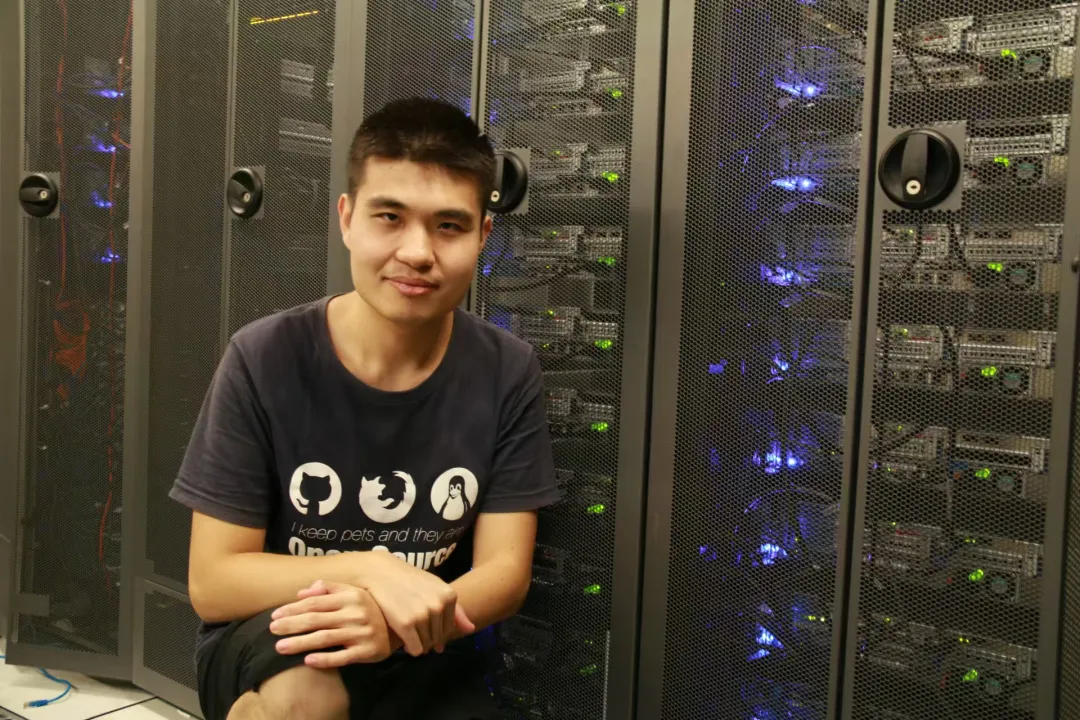
Long article warning, this article contains 10016 words, estimated reading time 27 minutes
“Dialogue” is a series of in-depth interviews launched by the Woke Advanced Alliance. We invite and interview outstanding alumni from USTC who have experienced setbacks, tasted failures, and achieved success during their university life at USTC. Through in-depth conversations, we hope to showcase their life journeys and personal choices, hoping that their experiences can illuminate more paths for future USTC students.
In this issue of the Dialogue column, we invited Senior Brother Li Bojie (personal homepage: 01.me), a USTC 1000 alumnus, USTC-MSRA joint PhD, one of the first Huawei “Genius Youth” awardees, AI entrepreneur, and co-founder of the USTC course evaluation community. He was an assistant scientist and deputy chief expert at Huawei’s Computer Network and Protocol Laboratory. He has published multiple papers at top conferences such as SIGCOMM, SOSP, NSDI, and ATC, and has received the ACM China Outstanding Doctoral Dissertation Award and the “Microsoft Scholar” scholarship.
This article is original by Woke Advanced Alliance. Do not repost without permission.
Interview, Editing | Feng Wenjun, Chen Lei
Proofreading | Zhao Guohua
Theme Summary
Learning and Practice Experience During University
How to View Mathematical Foundations
Development History of the Course Evaluation Community
How to Transition to AI Research
Academic Planning and Career Choices
Misconceptions and Suggestions for Choosing a PhD
My Academic Journey
“Interest-Driven Career Change”
Woke Advanced Alliance: We are very pleased to interview Senior Brother Bojie. Let’s start with your university experience. You initially studied mathematics and later switched to computer science. Could you tell us the reason for changing your major?
Li Bojie: Actually, the main reason I switched from mathematics to computer science was that I encountered difficulties in mathematics, especially in some basic courses where my grades were not ideal. I felt that I was not doing well in the mathematics major, but I had a strong interest in computer science. I was initially a student in the Hua Luogeng class, but I found that advanced mathematics was very different from the mathematics in high school competitions, especially in solving practical problems, which was a big challenge for me.
My grades in calculus and linear algebra were quite poor, and I even failed some courses, so I realized that I was not good at this. In contrast, I had won some awards in high school computer competitions, and I was very interested in programming, system design, and website development. This made me decide to switch to the computer science major at USTC. Initially, I thought mathematics would suit me better, but due to my grades, I eventually switched to computer science. Looking back now, if I hadn’t switched, I probably wouldn’t have achieved much in mathematics.
Woke Advanced Alliance: So it was an interest-driven process. But you mentioned that your grades in basic courses during your undergraduate studies were not ideal. Do you think this affected your development?
Li Bojie: It was indeed an interest-driven process. Regarding grades, I believe that grades are not necessarily the most important thing. School exams and actual abilities are not always related. I remember taking a database course during my undergraduate studies, and although I later achieved some results in database research, my grade in that course was not ideal. This was because the course content was theory-heavy, with little practical application. I remember the exam questions included the three basic types of databases, and since I didn’t attend classes properly, I naturally didn’t know these contents. Although theory is important for researchers, if I can use this knowledge, the theoretical part is not so critical. Additionally, the course involved various normal forms, which didn’t have much practical use for me. Therefore, I didn’t particularly value course grades during my undergraduate studies because I felt that the practical use of these contents was limited, and spending a lot of time boosting GPA wasn’t worth it.
Woke Advanced Alliance: Many students feel anxious about GPA. It seems that you didn’t feel much pressure in this regard. Did you feel anxious when you saw your GPA was not as good as others?
Li Bojie: I didn’t feel anxious myself. I remember when I went to Microsoft, my GPA was 3.4, but because two course grades were affected by coverage issues, my final GPA at graduation was 3.33, which is indeed not high. For you, this score might seem low, but I don’t think it affects my career development.
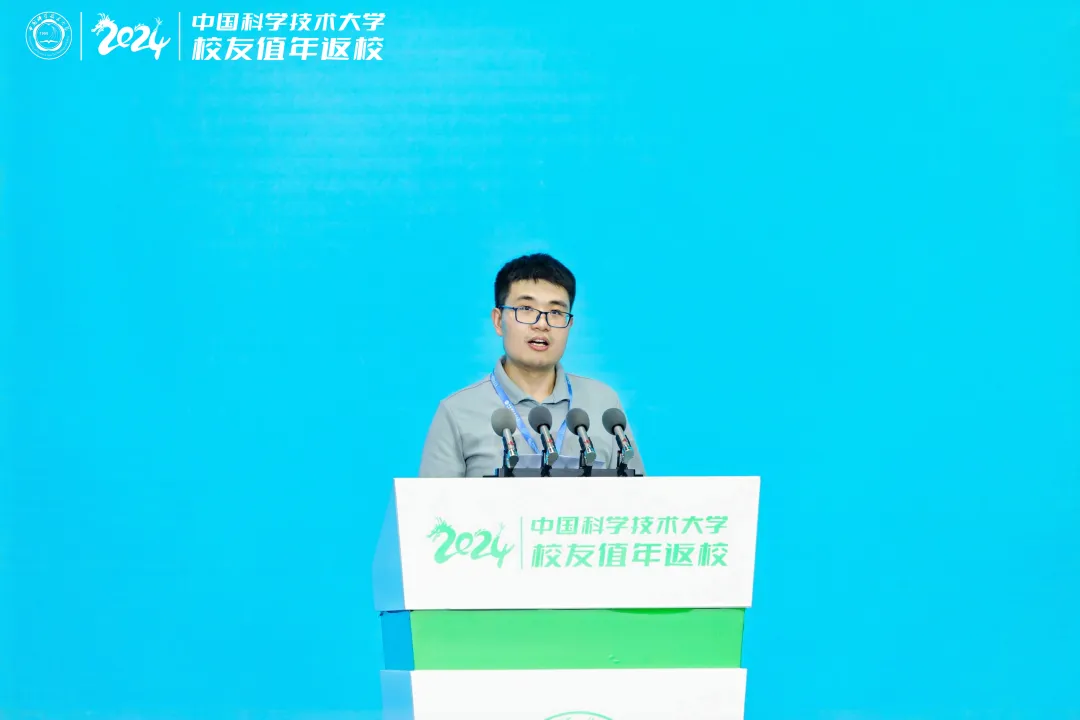
Image: Li Bojie speaking as a representative at the 2024 USTC Alumni Reunion
“How to View Mathematical Foundations”
Woke Advanced Alliance: I feel that your hands-on ability is very strong, which might be something some USTC students lack. USTC is a school that places great emphasis on mathematical foundations. How do you view the relationship between mathematical foundations and research in the field of computer science?
Li Bojie: I think mathematical foundations are helpful for my research. Recently, I’ve started doing a lot of AI-related work, and these mathematical foundation knowledge indeed plays a role. Many basic concepts of algorithms actually originate from theoretical physics and statistics. These foundational concepts are crucial for understanding complex computer algorithms. For example, the 2024 Nobel Prize in Physics was awarded to scholars working in AI, which shows that there are many deep connections between these two fields. Moreover, if you want to do some cutting-edge research in the AI field, mathematical foundations are still very important.
However, sometimes there are issues in actual teaching. Teachers from the mathematics or physics departments teach foundational knowledge to computer science students in their own way, creating a sense of disconnection between courses. For example, when teaching linear algebra and stochastic processes, the course content might just have students memorize formulas and solve problems without providing the background of these theories in practical applications. This makes it difficult for students to understand the true meaning and application value of formulas, and in many cases, it’s just “memorize this formula to solve problems,” which is obviously limited.
If teachers could combine relevant computer science backgrounds and explain the practical applications of these mathematical theories in AI or other computer science fields, students would better understand the value of this knowledge. Mathematical foundations are indeed important, but sometimes teaching methods need improvement.
Some of my classmates went abroad for their PhDs and had to relearn some foundational mathematics courses. Initially, they might think, “Didn’t I already learn linear algebra? Why learn it again?” But quality courses focus on explaining the relationship between theory and practical application, which helps students better understand the relationship between theory and practical application. Many of my classmates only realized after this relearning that the knowledge they learned before was actually hollow.
Woke Advanced Alliance: So do you have any good methods for learning foundational mathematics courses? For example, can you refer to some foreign courses?
Li Bojie: I think a good learning method is to watch foreign courses. Nowadays, MOOCs are very popular, and many foreign courses can be found online, such as on Coursera and edX. First, learning English well is fundamental; if your English is not good enough, it might be difficult to understand these courses.
On this basis, I suggest directly reading some foreign original textbooks or watching their MOOC videos. Looking back at my own learning of mathematics and physics, I didn’t try to learn this way, but if I could have learned this way, the effect might have been better. If I could do it all over again, I would definitely take this approach. I would also recommend this approach to junior students, as it helps to better grasp mathematical foundations and avoid the hollow learning we experienced. Mathematical foundations are crucial for future learning and research, and the correct learning method can help them understand these foundational knowledge more deeply.
“How I Transitioned to AI”
Woke Advanced Alliance: If you had the chance to go back more than ten years, what other advice would you give yourself?
Li Bojie: There are indeed many. For example, if I could go back, I would advise myself to buy more Bitcoin, at least buy more, but that’s investment advice. After all, the value of Bitcoin was not widely recognized at the time, and many people didn’t realize its potential. However, in terms of learning, I think I can offer two aspects.
First, I would advise myself not only to focus on the systems field but also to get involved in some algorithm and artificial intelligence knowledge. At that time, I chose the systems field because I was doing research in this area during my PhD and early career. Back then, I didn’t “look up to” AI much, thinking it was just fitting some data and far from true intelligence. This early view was obviously limited by the technical level and personal understanding at the time, and now AI development is approaching human-level intelligence and can provide a lot of help in reality, which was something I didn’t foresee at the time. Therefore, I now realize my shortcomings in AI algorithms, especially in deep learning and machine learning, and I feel the need to supplement this knowledge. I would advise myself to learn more about and study the basic knowledge of AI algorithms, especially to urgently supplement these contents.
Secondly, I would advise myself to learn more mathematical foundations during my undergraduate studies, such as linear algebra and calculus. Although these might not be needed much when doing some engineering projects, like developing a website or optimizing system performance, when it comes to theoretical analysis or AI algorithm research, there are actually many mathematical principles supporting them. Therefore, mathematical foundations are very important for my later development, especially in theoretical analysis, where these foundational knowledge will play a key role. I believe having a solid mathematical knowledge can help me better understand complex algorithms and models, which is essential for in-depth research in any technical field.
Woke Advanced Alliance: How did you transition to AI research? What made you suddenly realize the importance of AI?
Li Bojie: This process was actually a gradual transition. First, at MSRA (Microsoft Research Asia), which was the best AI lab in China at the time, gathering many top researchers in the AI field, we had to attend an AI lecture every month or every two weeks while studying at MSRA. We had to learn, and after listening, we had to be assessed, so even if we didn’t want to learn, we had to. One lecture left a deep impression on me. I remember it was between 2016 and 2017 when computer vision was particularly popular, and many strong people in the computer vision field went out to start businesses, which caused a phenomenon in the industry at the time, with everyone paying attention to and pursuing the development of this field.
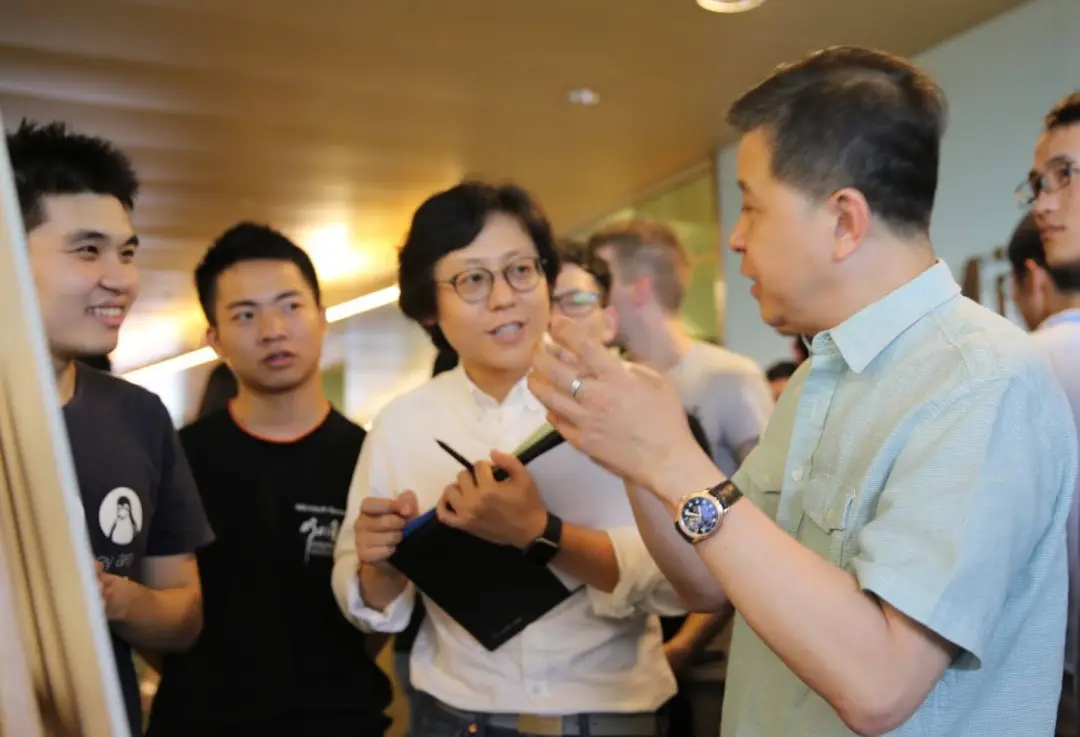
Image: Li Bojie presenting a research project to then MSRA Director Hong Xiaowen at the MSRA Student Techfest
By 2017, I attended a lecture given by a professor who showed two sci-fi movies, one of which was “Her,” which tells the story of an AI helping people handle various daily tasks and even alleviating the owner’s emotional problems. It can see, hear, and speak, helping you operate a computer, make phone calls, and later the protagonist falls in love with this AI. Initially, we thought it was just a movie, but the speaker emphasized that with the development of NLP and computer vision, future models would become increasingly powerful, potentially achieving intelligence similar to humans.
Another movie is “Black Mirror,” which features an episode where a girl revives her deceased husband by downloading an app. This app uses information from her husband’s social networks to mimic his language style. The small model demonstrated by the speaker can also do this. I can upload a segment of my own chat logs, and it can mimic your speaking style and remember some things that happened between you, although at that time, NLP wasn’t strong enough to handle complex topics. But I realized that this technology would have immense value in the future.
In 2017, I began to realize this and believed that the future of AI was very promising. By 2022, I tested the GPT-3 model and found its capabilities far exceeded previous NLP models, able to handle more complex issues, which made me deeply aware of the potential of AI technology. Although I didn’t fully understand it at the time, I already saw the prospects of AI. Despite not immediately deciding to dive into AI because GPT-3’s functions were limited at the time, only handling simpler problems like answering simple fill-in-the-blank questions and unable to engage in deep conversations.
It wasn’t until 2023, with the release of ChatGPT, that it achieved the ability to answer more complex questions, and its application range became broader. I tried several scenarios and found this technology truly impressive, especially in understanding and generating natural language, which made me feel its potential. This made me deeply appreciate the importance of this discovery, so I decided to fully commit to the AI field.
Growing from Practice
“Dare to Think and Do Experience”
WoKe Advanced Alliance: I think the life and experiences during university can have a profound impact on a person’s future. Looking back at your time at USTC, what do you think was the most unforgettable thing?
Li Bojie: I can share two things, one during my undergraduate years and the other during my graduate studies.
During my undergraduate years, participating in the Linux User Group (LUG) activities had a significant impact on me. When I first came to USTC, I knew nothing about Linux, not even a single command, and I felt very frustrated at that time. Facing a complex system and commands, I often felt at a loss. Joining LUG required a certain level of Linux proficiency, and initially, I couldn’t join because my level was too low, which brought me great frustration and challenges. Later, there was a very skilled senior, Zhou Miaomiao, in the Shaoyuan computer room, who was willing to teach me Linux commands, which helped me a lot. He patiently explained the function and usage of each command, even arranging some small exercises for me to learn Linux from scratch. Meanwhile, I was responsible for maintaining the main control room of the Shaoyuan computer room, including updating the Shaoyuan Student Union homepage, managing the Shaoyuan computer room network, and maintaining the Linux gateway server. Additionally, my classmate Guo Jiahua, who was a good friend of mine during my undergraduate years and also very proficient in Linux, taught me many commands, which gave me more confidence in the learning process.
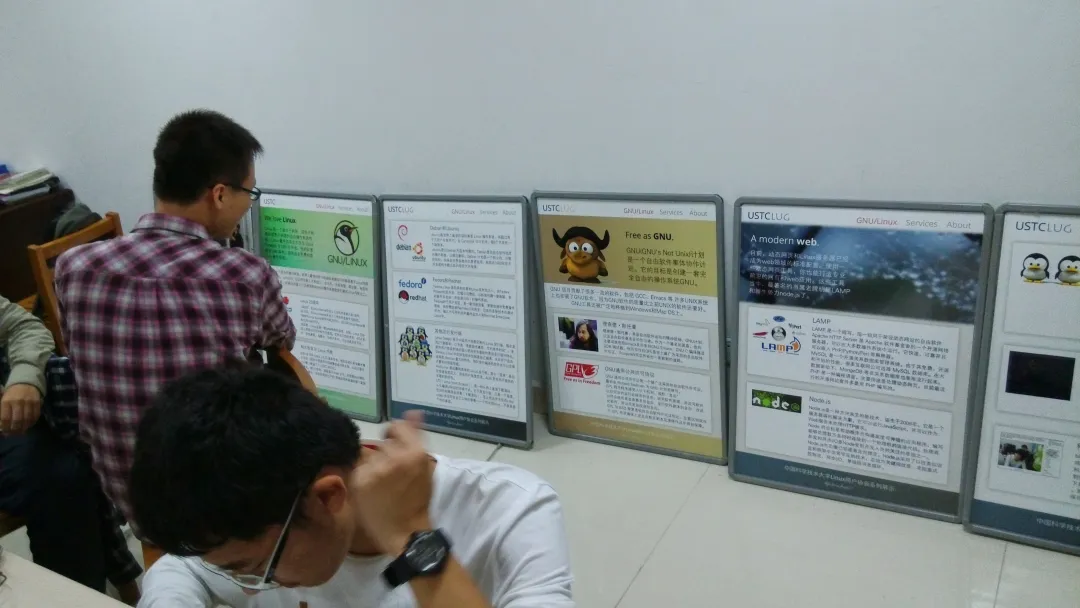
Figure: A corner of the USTC LUG activity room
After a year of learning, my skills gradually improved, and I joined the technical department of the Shaoyuan Student Union. Initially, the technical department was not formally established, but we realized the necessity of this department, so we proactively organized some technical activities, gradually forming the technical department. During this process, we discussed the goals and positioning of the technical department and actively attracted other students to join. Later, many technical experts emerged from the Shaoyuan Student Union technical department.
After that, I co-founded a platform called USTC Blog with Vice President Li Miaomiao, using WordPress for development. In fact, I created a PHP-based hosting system at that time, and after many iterations, I finally achieved sharing and isolation among multiple blogs, allowing users to create and manage their own blogs on the same platform. During this process, I delved into a lot of PHP’s underlying source code and performed numerous technical detail optimizations, especially when implementing the data sharing function between blogs, encountering many challenges. But through continuous experimentation, I eventually solved these problems. Later, I also created a cloud platform-like experimental environment using eight discarded servers from the Shaoyuan Academy. Although these servers were somewhat outdated at the time, I utilized them for continuous effort and investment, eventually successfully running two to three thousand containers. This process involved many challenges, such as resource allocation and performance optimization, but through continuous adjustments and experiments, I eventually overcame these difficulties and felt a sense of achievement brought by technology.
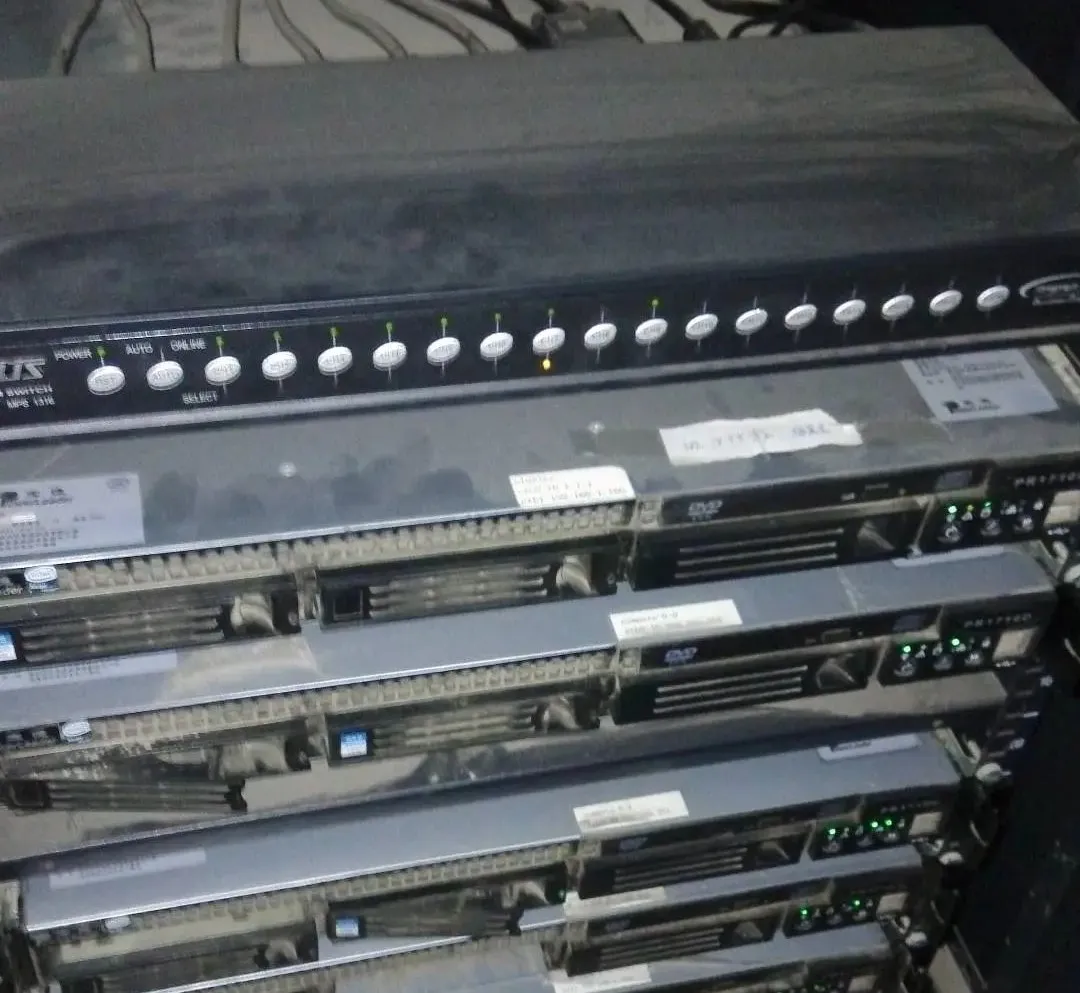
Figure: Old servers in the Shaoyuan computer room
I believe these experiences played an important role in my later development. Although my grades were not top-notch, under normal circumstances, I wouldn’t have been able to enter MSRA. Generally, to enter MSRA joint training, a GPA of at least 3.7 or 3.8 is required, but my GPA was far from enough, only about 3.4. However, at that time, Professor Zhang Yongguang and Professor Tan Kun from MSRA selected me from many resumes, one reason being the outstanding projects I participated in during my undergraduate years. Despite my low GPA, my hands-on ability and practical experience made me stand out, especially in those projects I participated in, such as the blog hosting platform, VPN, and cloud platform. These projects were technically advanced, so they believed I had high potential in this area.
“Developing a Course Evaluation Community”
WoKe Advanced Alliance: What was the second thing that had the greatest impact on you?
Li Bojie: The second thing was the experience of developing a course evaluation community, which had a profound impact on me. Around 2015, it was a project I did with my classmate Zhang Jingning. She had the idea of using computer technology to change education and create a course evaluation platform similar to MOOCs when she first entered university. I remember clearly that when she first entered the undergraduate stage, she noticed that students lacked information when choosing courses, especially freshmen. In 2015, she found a lack of a course evaluation website when selecting courses at school, which sparked her thinking.
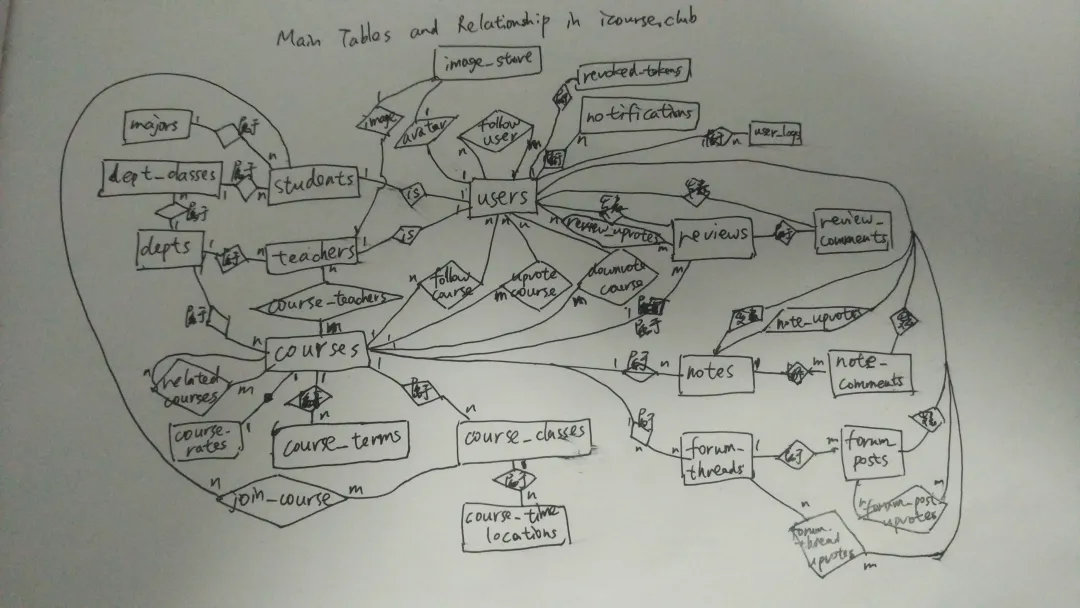
Figure: Database structure diagram when developing the first version of the course evaluation community
So, in her second semester of freshman year, we happened to have a “Science and Society Seminar” opportunity and started planning this website. We hoped this platform could help students share courses, teacher evaluations, and learning methods. In fact, there were already similar websites abroad, such as “RateMyProfessors,” so we wanted to create a USTC version. She invited me and my roommate Chang Zhen to participate in this project. Our team members included me, Zhang Jingning, and Chang Zhen. After about three to four months of effort, our first version of the website finally went live, during which we also experienced many details and maintenance work of the launch process.
Although this project seemed small, I think it actually solved a very clear user need, which is the so-called PMF (Product-Market Fit), meaning the product needs to meet specific user needs. In our case, students needed to know which teacher taught well, which course was worth choosing, and also needed to share learning methods and materials.
Moreover, currently, many visits to the course evaluation community are not even from within USTC but from external users who access the USTC course evaluation community through Google searches for course information. This makes me feel that this project solved a very valuable problem, although the problem itself is not big, it indeed can help everyone.
Additionally, although we initially did this project spontaneously and didn’t really intend to start a business or find a product manager to polish the product, our cooperation among the three of us was still very effective. Zhang Jingning was responsible for the product and front-end, while my roommate and I were responsible for the back-end and database setup.
From a design perspective, I think the USTC course evaluation website has advantages in product design compared to similar platforms at other schools. Although it went live earlier, the design details are excellent. For example, the homepage displays the latest evaluations, so users can see valuable information as soon as they enter, enhancing the user experience, while platforms at other schools might have an empty box on the homepage, not knowing what to look at. This design advantage greatly enhances the user experience.
Furthermore, our search function is also well done, supporting multiple search methods, not just exact matches. We have optimized the search system in many ways to ensure users can find the information they need through various keywords and course names. Many friends have also done a lot of work on optimizing the search system, which significantly improved search efficiency. We hope users can submit higher-quality evaluations, so we set up a series of mechanisms, such as allowing image uploads and text editing, which promote the generation of better quality content and improve the quality of reviews.
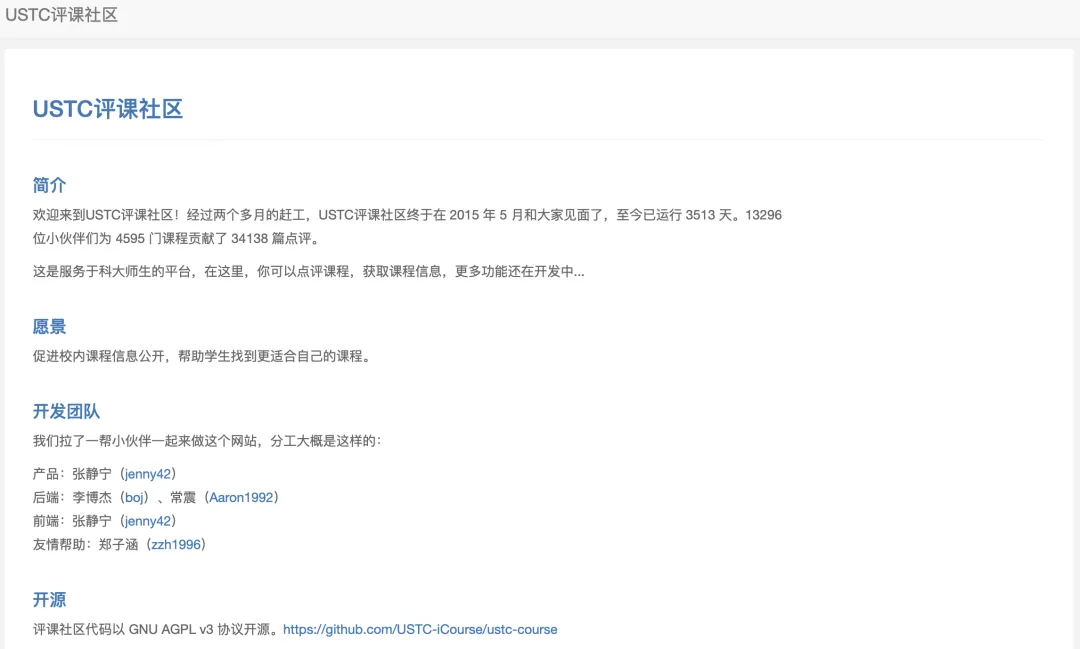
Figure: The course evaluation community deeply integrated into USTC students’ learning life, running for nearly ten years, with tens of thousands of students contributing over 30,000 reviews
Overall, although we didn’t realize the importance of this project at first, and were even somewhat uncertain initially, the final result made me feel a great sense of achievement, which I think is very important.
WoKe Advanced Alliance: Did you hear any voices of misunderstanding or doubts about such interests when you were involved in these extracurricular practices?
Li Bojie: There were indeed such situations. After all, what we were doing was an interest project, and many classmates might be more concerned about the value of this project. To attract everyone, we adopted some specific promotion strategies, such as offering books for writing reviews, but in the end, no one wanted the books we offered, and it was still through word of mouth that the project gradually developed. This process was gradual, making us realize that although initially not understood, the effort of persistence would eventually bring rewards.
Moreover, at that time, some teachers believed that students were not qualified to evaluate their courses, but I think since the teachers’ lectures are for students, students naturally have the right to evaluate the teachers’ courses. And I also thought of a concept in the current AI field—super alignment. The background of super alignment is how to ensure that an AI smarter than humans listens to human intentions and does not do evil. The key here is, if one day AI is smarter than humans, how can we evaluate it? This is like my evaluation of teachers at school. Although students’ abilities may not match the teachers’, their evaluations are still meaningful and can promote teaching improvement to some extent, providing a practical basis for course improvement.
WoKe Advanced Alliance: Did participating in these projects during university also give you more courage to try new things in the future?
Li Bojie: I think it did. During school, I tried many projects, including tinkering with blockchain Bitcoin and Ethereum mining during my Ph.D. studies. Although these mining projects were not directly related to my studies and research, I enjoyed the process of tinkering, which exposed me to diverse technologies and ideas. Through these practices, I realized that I could accomplish many things. Although I didn’t understand much at first, through trying, I quickly grasped the various technologies and principles in the process. This process of exploration and discovery made me realize that my abilities were constantly improving, and thus I became more confident.
Insights
“Academic Choices and Career Planning”
WoKe Advanced Alliance: You mentioned the topic of interest. From the perspective of current university students, what aspects do you think should be considered in personal career planning and academic planning?
Li Bojie: It actually depends on each person’s needs. Some people want to make a lot of money, for example, having earned a million but feeling it’s not enough, wanting ten million, or even a hundred million. For these people, choosing an industry closer to money might be more suitable. Many people’s interest in money constitutes an important motivation when choosing a career. Moreover, different people’s needs will affect their decisions when choosing a career. For example, some people pursue financial freedom and may focus more on the sense of achievement and social value of the work itself.
But if my goal is not to earn a lot of money, but to do something I’m interested in, such as exploring new technologies, participating in social welfare, and helping humanity, then I will focus more on doing important things. My aim is to bring more help to others through my efforts, such as promoting technological progress or improving social welfare. In the long run, I don’t care too much about whether these things can bring me financial returns. This attitude makes me more determined and focused when pursuing my goals. Everyone’s choices and motivations are different, and personal interest is particularly important in this process.
In addition to motivation, when considering whether to pursue a master’s degree or study abroad, it is also necessary to discover one’s comparative advantage. Comparative advantage refers to the areas where I have more advantages than others, such as certain specific skills or resources. For example, if I have to choose between School A or School B, and the mentor at School A is not very good, while the mentor at School B is excellent, I would choose School B. An excellent mentor can provide me with more resources and help me stand out in school. When choosing, I will consider the mentor’s reputation, research direction, and the opportunities they can provide, as these will affect my academic and career development. At the same time, when making a choice, I will ensure that this mentor can provide sufficient support and resources in my field of expertise. When choosing a school, I will ensure that I choose places that allow me to fully showcase my abilities and potential. Of course, the overall quality of School B should not be too poor to ensure my development potential.
The same goes for career choices. If there are two companies to choose from, and the first company offers 30% higher salary, but the work content is relatively basic, with everyone doing similar things like a cog in the machine, lacking uniqueness. Meanwhile, the second company, although offering slightly lower pay, has a very critical position that the company urgently needs. In the second company, I can take on very important responsibilities, which not only allows me to gain more personal growth but also create greater value for the company. Taking on such key responsibilities will directly impact my career development. In such an environment, I can quickly enhance my abilities and gain more development opportunities.
This is why I chose to join Huawei initially. At that time, Huawei’s research in high-performance networks was relatively scarce, and my Ph.D. mentor happened to be at Huawei, so I could participate in some very critical core projects and grow rapidly. My participation not only helped Huawei solve practical problems but also promoted my career development, and I was selected for Huawei’s “Genius Youth” program. The mentor’s guidance and resource support played a crucial role in my career development. If I went to another company, there might already be many people doing similar things, and my growth would be limited, affecting my career development. Therefore, my choice is always based on my comparative advantage in this field.
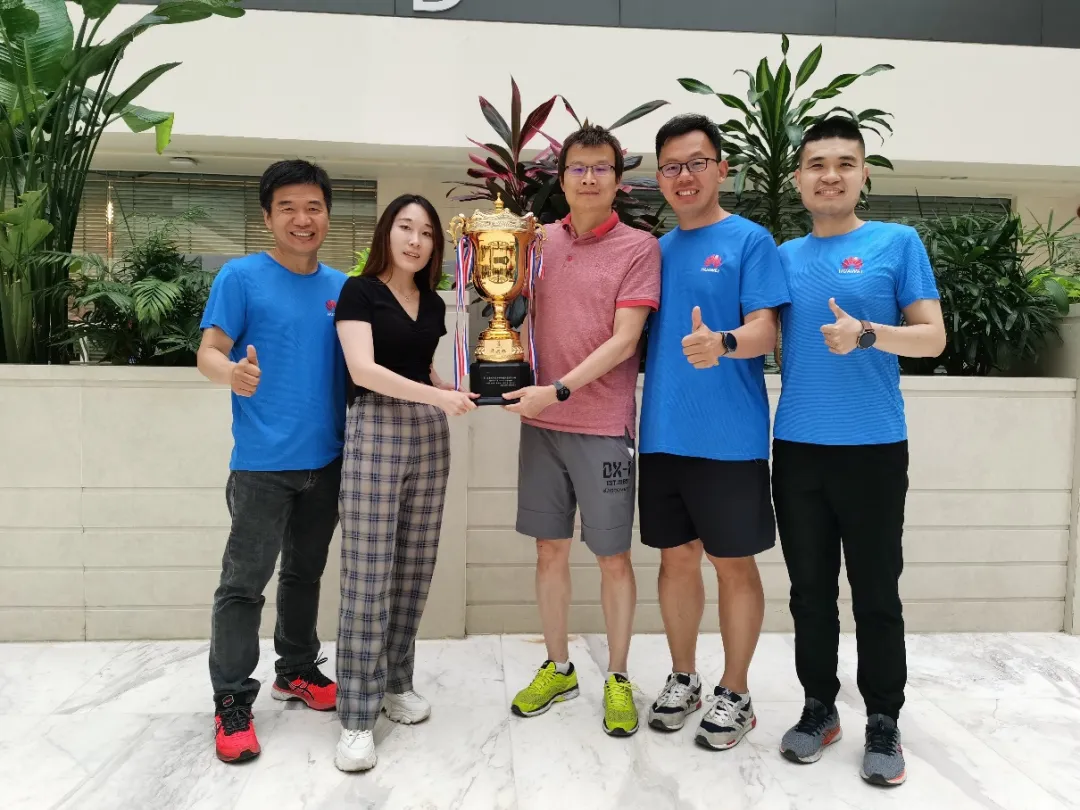
Image: Li Bojie (first from the right) winning the Huawei Running Club team mileage championship
Snail Shell Advanced Alliance: Many students consider whether to pursue a Ph.D., especially computer science students. What are your views and suggestions, senior?
Li Bojie: Regarding pursuing a Ph.D., I am also a Ph.D. student, but unfortunately, I have seen some very capable juniors not having as smooth an experience as imagined during their Ph.D. studies. Their engineering and academic abilities might have been stronger than mine when they graduated from undergraduate, but they didn’t achieve as many academic results during their Ph.D.
I believe the biggest factor here is the so-called research taste, which is mainly related to the research group and mentor the student is in. I think a Ph.D. student’s research taste is basically equivalent to their mentor’s research taste. If the research taste is not well cultivated, a Ph.D. student will face significant limitations in their academic development.
If you choose a mentor with low academic ability, their guidance level might also be low; some mentors, although having high academic status, might not have much time to guide students. In such cases, the mentor cannot help much in the student’s growth and academic development. These are common mistakes when choosing a Ph.D., especially during the selection process, many people may not realize the importance of the mentor.
Moreover, many undergraduates considering a Ph.D. often do not realize the importance of the mentor, still thinking that attending a top 50 school or a prestigious university is good enough. But choosing a suitable mentor is more critical. Many students only focus on the mentor’s citation count, ignoring other factors such as whether the mentor’s research direction aligns with their interests and the mentor’s guidance ability and available time. These are important criteria. Therefore, I hope everyone can realize the importance of choosing a research group, research direction, and mentor, which are crucial considerations during a Ph.D., especially for most undergraduates.
So, I suggest everyone weigh their decisions carefully, especially clarifying how to judge the quality of a mentor, including their research achievements, guidance experience, and time investment.
Snail Shell Advanced Alliance: For those who haven’t pursued a Ph.D. yet, what do you think is a reliable research method, senior?
Li Bojie: I think gaining practical experience in advance is a good choice. Nowadays, many undergraduates have the opportunity to participate in various research projects, and many find that the field is not as interesting as they imagined after trying it. For example, I had a classmate who was particularly interested in quantum during undergraduate, so he interned in a related project group, but the actual work involved setting up optical paths and multiple lenses every day. The optical path experiment process was very complex, involving precise placement of multiple lenses, and any mistake could take one or two days or even a week to correct. This made him realize the significant gap between his imagined high-end research and reality, leading him to switch to the computer field. I think this transition process is also a reflective experience. I believe many people, before entering a field, often have an incomplete understanding based on media or external publicity, even having misconceptions, which can affect their choices and development.
Students working in AI might have similar experiences. Initially, they see ChatGPT and think AI is amazing, wanting to train a model stronger than it, but during the Ph.D., there aren’t enough resources to train such models. The lab might only have a few GPUs, which need to be shared with other students, ultimately only allowing for small projects, and the mentor’s research direction might be in a niche area, leading to feelings of disappointment and helplessness.
Personally, the field I chose was carefully considered. During my undergraduate, I participated in multiple research projects, tinkering with many systems, including websites and network services. Later, I went to MSRA to do system research, so I didn’t feel a gap.
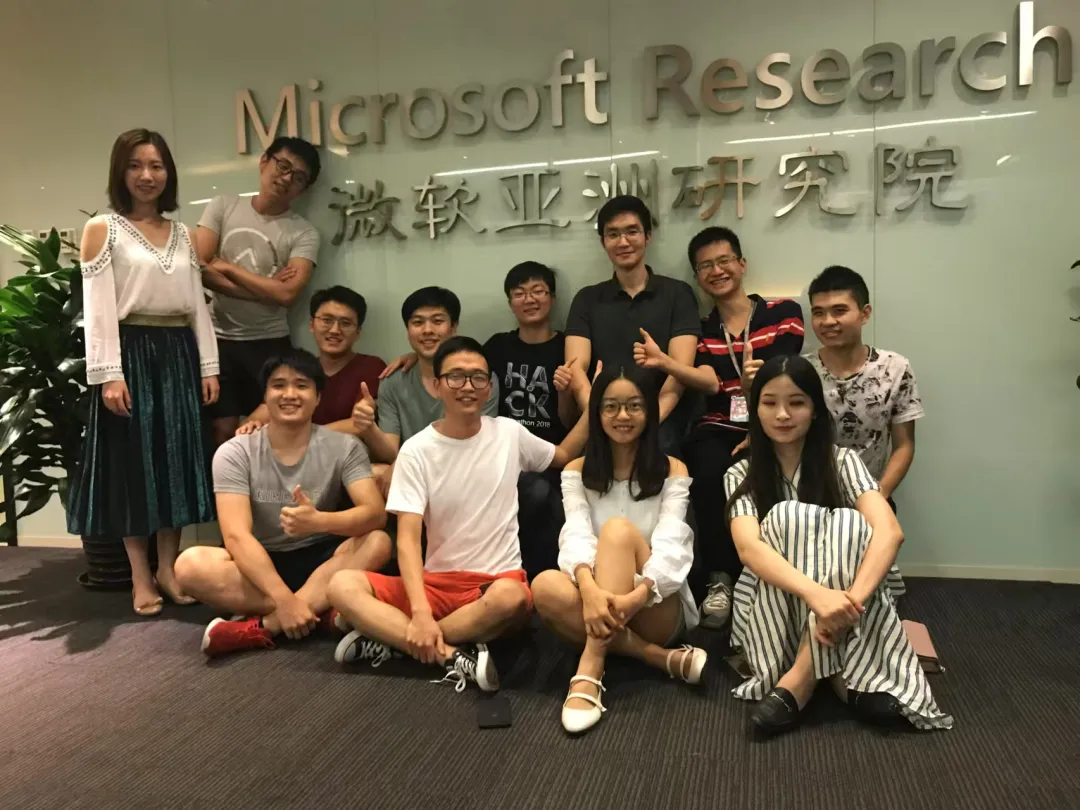
Image: Li Bojie in a group photo at MSRA
Therefore, having some concept of the field in advance is very important. Before AI, it was difficult to find someone suitable to explain complex concepts, like undergraduates wanting to know about large models, and those who truly understand often don’t have the energy to explain. Finding a suitable guide is quite challenging. But now with AI, it can help you understand some basic knowledge and related papers. If you want to join a mentor’s research group, such as research related to large models, you can give AI a few papers, and it can explain them in an easy-to-understand way, allowing you to have a deeper understanding of the field. I think AI’s importance in learning is self-evident, as it can help you grasp complex knowledge in a straightforward manner, having a significant positive impact on learning.
Snail Shell Advanced Alliance: You mentioned the importance of a good platform for research, which sometimes is also an opportunity. Meeting a good platform and the right mentor gives you a better chance to conduct excellent research.
Li Bojie: I completely agree with this. An excellent Ph.D. research environment and team can provide great opportunities. At MSRA, my research group gathered many smart and capable students who excelled in their respective fields, and the mentors were all leaders in the industry. Such an environment is very valuable, worth cherishing and striving for. If I were in a lab with few resources and little contact with the industry, my achievements might be greatly limited, with much less impact, such as lacking relevant applications and opportunities for practical transformation. Therefore, striving for a good research platform and opportunities is very important. This platform not only includes rich resources and equipment but also a good team collaboration atmosphere, which can truly promote personal research capabilities and the transformation of achievements.
To be continued, stay tuned!